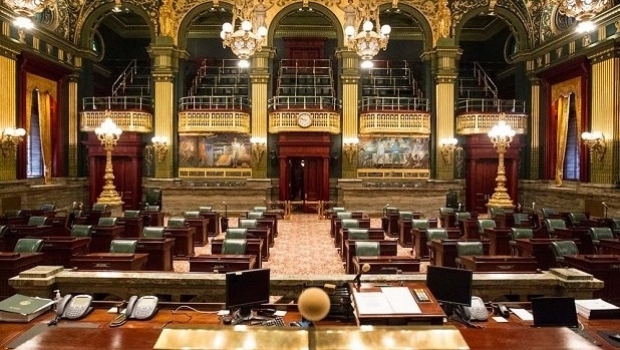- Pennsylvania is considering a bill to authorize video gambling terminals at more than 10,000 bars, taverns and restaurants throughout the state.
- Some prominent Republican lawmakers support the bill, but it is widely opposed by Pennsylvania’s casino industry and by a bipartisan coalition of legislators.
- Opponents to the bill argue that it will only siphon gambling revenues away from existing gambling operators, including sportsbooks.
- The bill has longshot odds to pass, as the opponents to the measure have been quite vocal.
A newly unveiled measure to expand casino-style gambling in Pennsylvania — already the nation’s No. 2 commercial casino state — is on the move in the Legislature in a bid to help the state. The passage of the October 30th gambling expansion bill made Pennsylvania the fourth state to legalize online gambling, joining Nevada, New Jersey, and Delaware. Pennsylvania is the only state to offer both gaming and lottery tickets online.
Pa Gambling Expansion Bill Details
HARRISBURG, Penn. – Republican lawmakers in Pennsylvania are pushing to pass a bill that would legalize and regulate video gaming terminals (VGTs) in more than 10,000 bars, taverns, and restaurants.
Many such establishments already offer unregulated electronic games of skill. The new legislation is billed as a way to bring gambling revenues from these establishments into the light.
Pa Gambling Expansion Bill
Under the proposed law, businesses with liquor licenses could have up to five regulated VGTs—a motion that proponents of the bill say could generate up to $250 million in state taxes.
Efforts to pass the bill have been led by Senate President Pro Tempore Joe Scarnati (R, Jefferson) and backed by wealthy lobbyists from VGT companies.
If passed, individual counties and municipalities would be able to opt-out of legalizing VGTs.
The proposed bill has been opposed by a number of groups, including both Democratic and Republican legislators, Pennsylvania casinos, and the manufacturers of the existing games of skill, who say that they cannot compete with “flashy” VGTs.

Pennsylvania is already one of the most lucrative gambling markets in the United States, with full support for most forms of online and retail gambling. There is some fear that adding more gambling options would only harm other sectors of the gambling market without increasing overall revenues.
The bill’s prospects appear to be waning as it fails to gain traction in the Legislature.
How Would Expansion Affect PA Gambling And Tax Revenues?
If the bill, as its proponents claim, brings unregulated gambling into the light so it can be properly regulated and taxed, it would indeed help Pennsylvania shore up its budget.
Opponents to the bill argue that it will just further saturate an already crowded Pennsylvania gambling market and siphon revenue from casinos, sportsbooks, and other licensed gambling operators.
They also point to the coronavirus and the ongoing protests of police brutality as issues that deserve priority over gambling expansion.
The reality is likely somewhere in the middle, but the $250 million figure cited by expansion proponents is certainly a gross exaggeration. To raise that amount of money in state taxes, VGT-licensed establishments in the state would need to earn an average of $70,000 in VGT revenue annually.
That would likely entail an average annual betting handle of nearly a million dollars per establishment.
How Would Gambling Expansion Affect PA Sports Betting?
It is impossible to know for certain exactly how widespread availability of VGTs would affect the behavior of bettors, but it certainly wouldn’t increase sports betting revenues.
One possible silver lining is that legalizing VGTs would open the door for similar legislation to allow sports betting at the same establishments. Doing so likely wouldn’t increase overall sports betting revenues, but it would increase flexibility.
Ultimately though, the potential drawbacks for the sports betting industry would far outweigh the potential benefits.
News tags: Democrat Joe Scarnati Pennsylvania Pennsylvania Legislature Republican VGT video gaming terminals
With a dual background in English and sports performance and business analytics, Carter aims to write stories that both engage and inform the reader. He prides himself on his ability to interweave empirical data and traditional narrative storytelling. When he isn’t keeping readers up to date on the latest sports betting legal news, he’s banging his head against a wall regretting his decision to be a Tampa Bay Buccaneers fan.